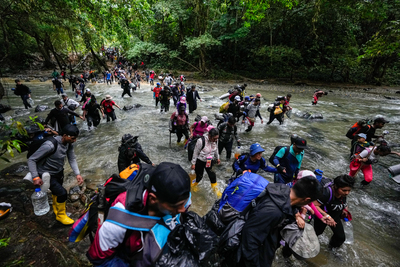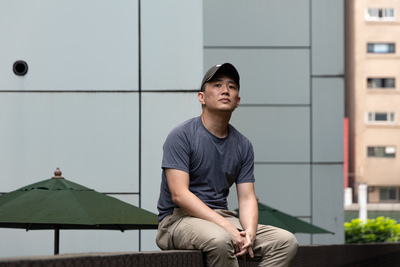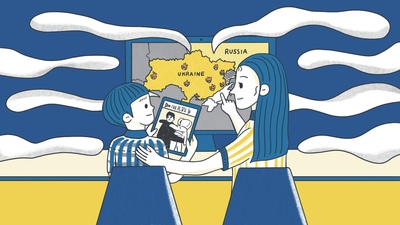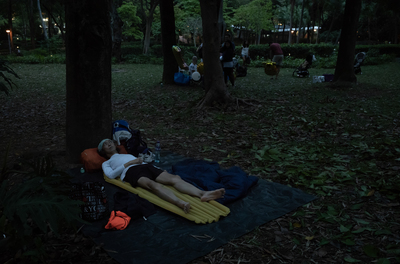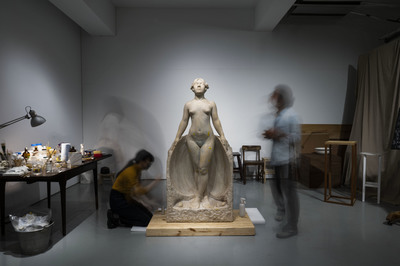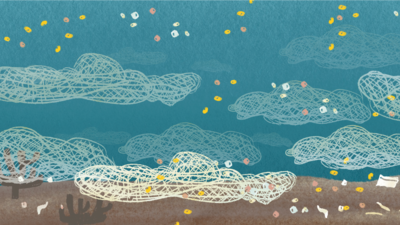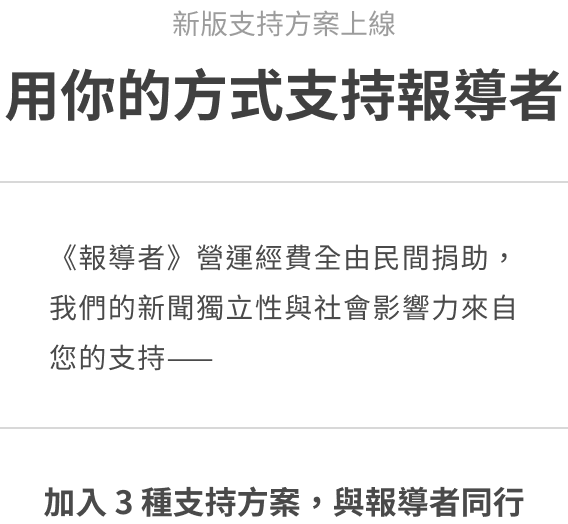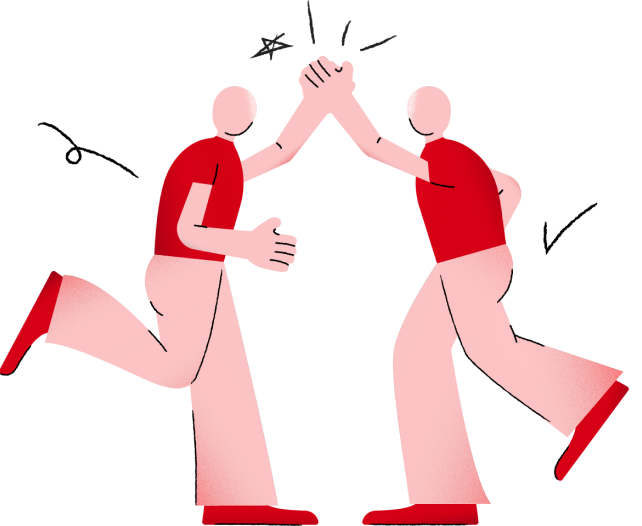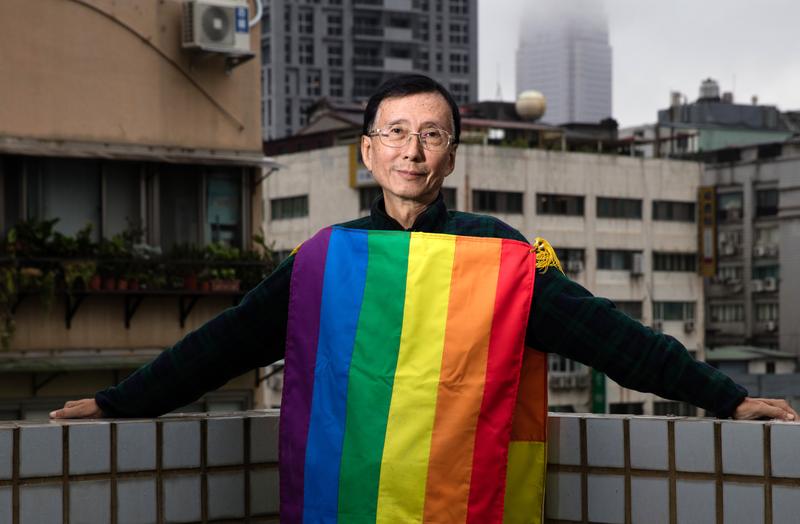
The first thing you see on Chi’s business card is his Chinese name printed in bold letters, occupying half the space. That’s followed by his English name and phone number in smaller print. There is no company phone number, nor any mention of a profession or job title. When his name appears in media, journalists often have a hard time attributing a fixed term to what he does.
Who is Chi Chia-wei (祁家威)? The media has attempted to assign him a myriad of titles: “famous gay person”, “the first openly gay Taiwanese person”, “senior AIDS assistance and prevention volunteer” and “senior LGBT activist”. Unlike other participants in the LGBT movement, who are often senior members of an organization and throng the street in groups, Chi, whose versatile identity refuses to be adequately described by a single title, attends pride parades on his own. Each year, Chi stands out from the multitude by waving his huge signature rainbow flag.
In 1986, the 28-year-old Chi held an international press conference announcing his sexual orientation, making him the first publicly gay Taiwanese person. Chi says that despite the press conference being crammed into a McDonald’s, it attracted reporters from many overseas news outlets, including the Associated Press, Reuters, and AFP.
I asked how Chi came in touch with these domestic and foreign media. Chi, with an expression that seems to say “it’s not a big deal,” explained how he arranged his one-person-press conference.
“There’s a mailbox for Taiwan’s Central News Agency on Songjiang Road. I threw notifications in every single one of them. Taipei didn’t have the MRT system yet, so I decided to hold it at a McDonald’s. I bought 20 cups of fruit juice, but the manager was quite unhappy because of the flashlights and asked me to stop holding it.”
Seldom enthused by collective group action, Chi has been on his own since the 1980s. He would search out for AIDS victims in Taiwan, and then raise funds for them on the streets. He’s also worked as an LGBT consultation hotline operator, and quietly fought against unconstitutional actions in court. Chi is the very embodiment of Taiwan’s LGBT history.
Many people in Taiwan remember him strolling through night markets in the 1990s, collecting funds for AIDS treatment and prevention. To attract attention, he hung a donation box from his neck, and dressed up as cartoon figures, mummies, and once in an outfit made of condoms.
He garnered short-lived attention through a number of news headlines, but because of his identity, thin frame and profession as an AIDS prevention volunteer, he was greeted with averted heads by passersby. “I remembered, in Tonghua Night Market, people walking by briskly and pretending not to see me,” says Chi.
Cheng Chih-wei (鄭智偉), director of volunteer services at the Taiwan Tongzhi Hotline Association (同志諮詢熱線), remembers the first time he met Chi in elementary school. Cheng was already fully aware of Chi’s sexual orientation, as well as his own. But out of fear of being found out by his family, Cheng pretended not to hold any feelings towards Chi.
“It all boiled down to two factors. First, he’s gay. Second, the media was portraying him in a negative light, as if he was some kind of weirdo,” said Cheng.
The less-than-friendly media portrayals of Chi were not only perceived by the young Cheng, but also by other members of Taiwan’s LGBT community. For those who lead a painful life in the closet, only Chi truly understood how they felt.
"Before the creation of the hotline, I used my personal number for consultation purposes. I didn’t have to pick up the call manually, through a single click, I could connect calls that were previously on hold,” says Chi. After announcing his consultation line to the public, he received a large number of calls from troubled gays and lesbians, every single day.
In 1994, he received phone calls from two high school girls, Lin Ching-hui (林青慧) and Shih Chi-ya (石濟雅). Lin and Shih attented Taiwan’s most prestigious girls’ high school, Taipei First Girls' High School (北一女). Shortly after their call to Chi, both girls committed suicide, shocking Taiwanese society. “I really did not expect this kind of tragedy to happen, or else I would have tried harder to persuade them,” laments Chi.
Just like Cheng previously described, in an era of conservatism, “the first gay person in Taiwan” was often depicted as a weirdo in the media. Or perhaps it is his very “weirdness” that allowed him to resist society’s apathy and carry on his marathon-like run of activism for so long.
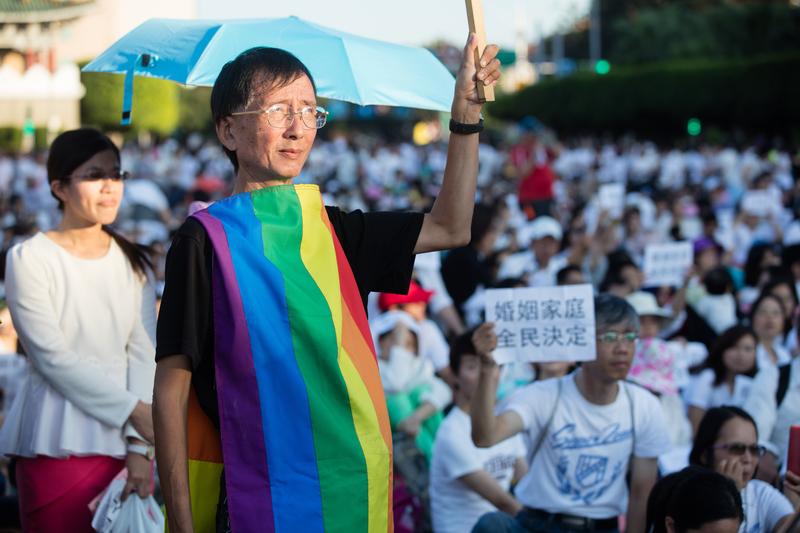
“Resistance? I encountered no resistance. But those who are less experienced are not so lucky.” When being asked if he has faced opposition in his career as an activist, Chi quickly gives a negative answer, as if such an assumption is unthinkable.
As LGBT activism flourishes in Taiwan, Chi is no longer the centre of focus in the news. Still, at many LGBT movement events, Chi can be seen watching the bustling scene in the corner like a quiet guardian.
I ask him why he attends every single news conference. He laughs and says he is acting as an “air convoy.”
“Some reporters ask really scathing questions. With my experience, I can tackle them,” he says.
Chi remembers one instance when a journalist from a major publication asked if he was a “top or bottom.” When confronted with such an improper question, many people would be stunned for half a second. Chi answered the question with a witty twist, “I can be both, whatever suits you.” The reporter didn’t say anything more.
Once, a gang member with his pretty girlfriend approached Chi while he was fundraising in the night market. “I respect you, Mr. Chi, but it is a pity that you are …” The sentence was left unfinished. Chi knew his question was directed at his sexual orientation. He replied calmly, “Brother, you spent your whole life with women, whereas I spent my whole life with men. You are a man among women, while I am a man among men.” After the gangster heard Chi’s reply, he bowed, apologized, then left.
When asked about his secret to living with confidence and ease, Chi recalls when he first took part in activism. After explaining his circumstances and plans to a respected high school teacher, Chi asked for advice on what to pay attention to. The teacher said, “you are lacking in confidence.” After repeating the questions several times in disbelief and getting the same answer, Chi was convinced that he can only continue on this path with a more confident attitude.
Although Chi claims there was little opposition two decades ago, he refuses to use a Facebook account or use other social media. He repeatedly mentions that his phone is being monitored by the National Security Bureau. Worried that his personal information would be stolen, and a profound sense of insecurity, Chi bears the marking of Taiwan’s authoritarian period.
In October 2016, Chi won the first “Queer Pioneer Award,” by Taiwanese organization Queermosa. In the Chinese dictionary by Taiwan’s Ministry of Education, pioneer is defined as a founder or leader of things. As for gay activism, Chi is the veritable pioneer on his own solitary path. During the award ceremony, Chi was clad in a red suit and a huge rainbow clock, with his face full of pride.
Shortly after the ceremony, Chi participated in the Taipei Pride run. Forgetting to dye his hair, with his white hair coming through, a news agency intern asked him, “grandpa, are you here to accompany your grandchild?” Chi was wordless for a moment, but kindly reminded them to Google him after the interview. The next day, he received a phone call, and an apology. As time moves forward, less and less people know about this pioneering activist.
On December 10th, due to the impact of recent movements to legalize same-sex marriage, the Marriage Equality Concert held on Ketagalan Boulevard attracted more than 250,000 attendees. Holding up a rainbow flag, Chi stood on a tree next to the stage for the entire afternoon, just so his flag was the highest among the 250,000.
Aren’t you lonely on that tree? I was tempted to ask, but at the end, I swallowed back my question.
Being rejected by his love interest, Forrest Gump begins his one-person-marathon in pursuit of a better life. He runs and runs. When he comes to a stop, a crowd of followers is tracing his step. The same goes for Chi, who has run a marathon for LGBT activism, unaccompanied since the beginning. At the end, his 1-person-jog turns into a 250,000 person-relay.
Perhaps, in these 30 years, standing on that tree has been his least loneliest moment.
(To read the Chinese version of this article, please click: 從1個人到25萬人 祁家威的同志運動長跑 )
用行動支持報導者
獨立的精神,是自由思想的條件。獨立的媒體,才能守護公共領域,讓自由的討論和真相浮現。
在艱困的媒體環境,《報導者》堅持以非營利組織的模式投入公共領域的調查與深度報導。我們透過讀者的贊助支持來營運,不仰賴商業廣告置入,在獨立自主的前提下,穿梭在各項重要公共議題中。
你的支持能幫助《報導者》持續追蹤國內外新聞事件的真相,邀請你加入 3 種支持方案,和我們一起推動這場媒體小革命。

